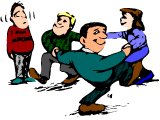Isaiah G.
In-group versus Out-group
Group behavior/Obedience to authority
If a person says, are you in, or are you out, what would a person’s response be most likely? Would there response be that of certainty or uncertainty? Well, I am pretty sure that most people would pick in, because they want to belong. They want to fit in. They want to feel a since of purpose. But, what about out, if a person is out, are they not in, or if a person is in are they not out? If a person was out of society, would they feel as though they have a say, or belong to a specific group? Would they, the out-group, be obedient to society’s authority or vice versa? Well, in the following paragraph, I will explain how groups behave and function differently under authority of society.
There are two distinct groups in society with one of them being the in-group. The in-group according to sociologists is stated as, “People that feel they belong”, “we or us”. Take high school for instance, the in-group could be people such as, jocks, cheerleaders, or rich kids. These high school kids belong to a specific group in which they command power. They are the authority, the it factor, the clique, or more importantly society’s stand outs. If the in-group is the authority, then they may not be obedient to society’s rules, because they make them. Now, the in-group on the other hand doesn’t feel, “threatened, or antagonized by others” as stated in the Sociology Matters 5th edition like those people of an out-group. An out-group unlike an in-group has feelings of not belonging in society. For example, in high school, the out-group could be people such as, drop outs, nerds, push overs, and low lifes. These high school kids would then belong to a specific group in which they don’t command power. They are the majority, but not the authority. They see themselves as different and not belonging to society’s A-list group. They are obedient to society’s rules of authority, because they feel they have no power. They shun themselves from the in-group and feel they don’t have a say in authority. But, little do they know, they do!
In-group versus out-group, if a person is a part of an in-group, then that means they belong; however, if a person is a part of an out group, then that means they don’t belong, right? Sadly, the reality is that there are two different distinct groups in society, the one that matters and the one that doesn’t feel as though they matter. However, like I said before the out-group is just as important as the in-group. They do have a say in society and just might not realize it. Their actions don’t go unnoticed. It’s just a matter of society playing tricks on their minds. In the end, authority will always reign supreme, as long as there are groups to be obedient and follow authoritative ways of a certain group.
Isaiah G.
In-group versus Out-group
Group behavior/Obedience to authority
If a person says, are you in, or are you out, what would a person’s response be most likely? Would there response be that of certainty or uncertainty? Well, I am pretty sure that most people would pick in, because they want to belong. They want to fit in. They want to feel a since of purpose. But, what about out, if a person is out, are they not in, or if a person is in are they not out? If a person was out of society, would they feel as though they have a say, or belong to a specific group? Would they, the out-group, be obedient to society’s authority or vice versa? Well, in the following paragraph, I will explain how groups behave and function differently under authority of society.
There are two distinct groups in society with one of them being the in-group. The in-group according to sociologists is stated as, “People that feel they belong”, “we or us”. Take high school for instance, the in-group could be people such as, jocks, cheerleaders, or rich kids. These high school kids belong to a specific group in which they command power. They are the authority, the it factor, the clique, or more importantly society’s stand outs. If the in-group is the authority, then they may not be obedient to society’s rules, because they make them. Now, the in-group on the other hand doesn’t feel, “threatened, or antagonized by others” as stated in the Sociology Matters 5th edition like those people of an out-group. An out-group unlike an in-group has feelings of not belonging in society. For example, in high school, the out-group could be people such as, drop outs, nerds, push overs, and low lifes. These high school kids would then belong to a specific group in which they don’t command power. They are the majority, but not the authority. They see themselves as different and not belonging to society’s A-list group. They are obedient to society’s rules of authority, because they feel they have no power. They shun themselves from the in-group and feel they don’t have a say in authority. But, little do they know, they do!

This image shows the in-group who are in a circle. If you notice clearly, the man in the bluish-green sweat shirt is smirking as he knows there in control. Then all the way in the back is the one person in the red sweat shirt. He is from the out-group. He feels that he doesn’t belong in the in-group’s circle.
No comments:
Post a Comment